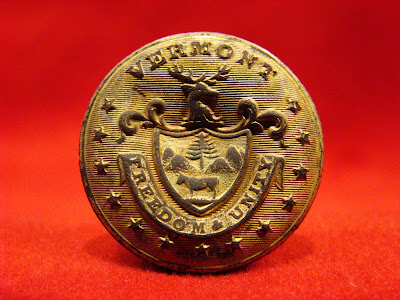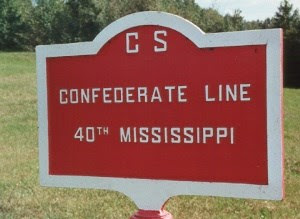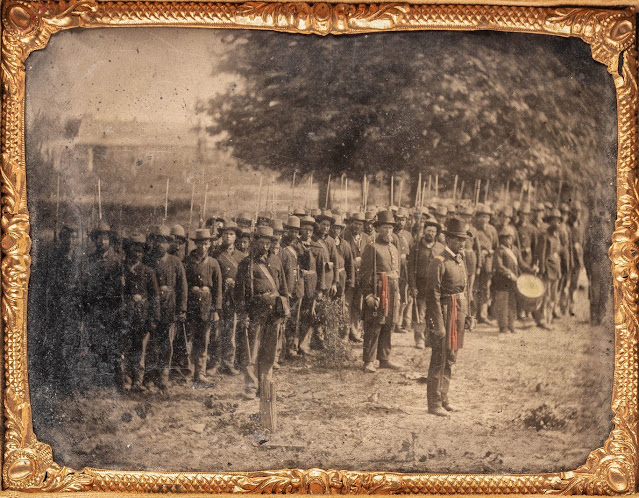Vermont and Vicksburg
 |
| Vermont State Militia Button featuring the state seal and motto of Freedom and Unity. |
One does not typically associate the state of Vermont with the Vicksburg campaign. No troops from the Granite State were assigned to Grant’s army although there were two Vermont artillery batteries and the 8th Vermont Infantry with General Nathaniel Banks’ army then besieging Port Hudson downstream from Vicksburg. However, three brigade commanders of Grant’s army were native Vermonters including one of the best fighters in the army, General Joseph Mower, and based on what I found while perusing some of Vermont's wartime newspapers, there were some native Vermonters serving in both armies at Vicksburg. Among those discoveries was a letter from a soldier in the 15th Illinois Infantry and another (even more surprising) from a captain in the 40th Mississippi.
The first letter was written by Private Joel Battie Buswell who was serving in Co. H of the 15th Illinois. Buswell wrote this letter in the midst of the siege back to his older brother James residing in Barton, Vermont. The 15th Illinois was part of the Second Brigade (Colonel Cyrus Hall), Fourth Division (General Jacob G. Lauman), of the 16th Army Corps corps during the Vicksburg campaign. Buswell's account of the siege of Vicksburg was originally published in the July 10, 1863 edition of the Orleans Independent Standard.
The letter from the captain in the 40th Mississippi follows in the second section.
On half mile from Vicksburg, Mississippi
June 9, 1863
I wrote to brother
Chase the 16th of May but since then we have been very busily
engaged in moving and fighting. Our division forms part of the line which
surrounds the enemy’s works, We are on the extreme left and on the line just
about half the time, or 24 hours out of 48. I have just come off the lines and
avail myself of the opportunity to write hoping it may go up the river in the
course of the week.
Grant and his
army have in the last month done all that could be expected. He has taken 64
pieces of field and siege guns and 8,000 prisoners and I judge about 20 deserters
come over to our lines daily. The weather is extremely warm averaging about
90-100 degrees at midday. The country hereabouts is entirely of hills with now
and then valleys but little wider than a road. The soil is sandy and abounds
with insects called chiggers. They are within the dense canebrakes and are
about the size of the point of a sewing needle covering one over with sores.
Unit the day before yesterday I suffered much and found the remedy to be sweet
oil applied externally in which they cannot work.
The lines
around this place are 15 miles or more in length, but the army is about half of
what you Eastern people think it to be. I judge with the late reinforcements
that there are no more than 75,000 fighting men and with this number the place
is invested. The rear is twelve miles distant at Big Black River bridge; other
roads and the Yazoo River are protected and if the enemy comes down upon us
from the east in too great of numbers, what we must do is evident to us all,
however terrible it seems to us. Nearly one half of the troops around this
place and perhaps more must fall in storming the enemy’s works. If needs be, it
will be the last resort and I blame not our generals. They have acted wisely,
bravely, and nobly. The fault is in not putting the drafting law in force
months ago so that all the old troops could have been sent to this place and
the rear protected by the new regiments.
In this case,
this ungodly work of taking works which have been two years in construction
would not have been necessary. I still have hopes it will not be necessary. If
Hooker with his 120,000 heroes can keep the Virginia army there and Washington
safe, and Bragg’s army happens to stay where it is, we will not storm the
works; otherwise, I am fearful we will. Vicksburg will be taken anyhow and I
have no doubt they would surrender within two weeks without such a sacrifice on
our side if we had men sufficient to protect the rear and hold the place till
their provisions are exhausted. They are now living on pea meal mixed with corn
meal and a half pound of beef or one-fourth a pound of pork per day to a man.
They have turned loose from their works towards our own lines all their mules,
horses, and Negroes. They fully realize the importance of the place to them,
and I doubt not will make almost any sacrifice to save it.
The cannonading has been
terrible by us at times. But the Rebels live in caves to such an extent that it
is not believed the place can be taken in that way. You may wonder how the
Rebels are kept from opening their guns and sending grape and canister shells
in our ranks. It is done by our keeping them from loading their guns and
keeping them from showing themselves over their works where we are near them
and where our lines are behind hills. We are in part their mercy, then again,
every time they open upon our lines the gunboats and mortars attend to them
until they cease. We are losing but few men.
We are in no very comfortable
condition having but one shirt to our backs, clothes torn, ragged, and dirty
without tents except a few old rags gathered up from Rebel encampments and but
few cooking utensils and but little to cook. Sometimes a little beef, hard
bread, coffee, and sometimes coffee and hard bread alone with now and then
pork. The magnolia tree grows naturally here to the size of two feet in
diameter. Canebrakes over hills thick as hair on a dog and many of the poles
are 20 feet in length. The boys killed an alligator down at Grand Gulf and they
are said to be in the Yazoo River but have seen none.
I have written this hoping it will give you an idea of what is going on near Vicksburg. It is hazardous times here just now and General Grant is successful so far in a great undertaking. It is a time when a man’s life needs to be insured by more than earthly power to be safe. I will not close without acknowledging the protection of Providence and live or die, sink or swim, I am in hopes to serve Him and receive his protection forever.
Joel B. Buswell, Co. H, 15th Illinois
 |
| 40th Mississippi marker at Vicksburg |
“The following letter is an extract from a private letter written by a Rebel officer who was a commissary in the army of Pemberton to a relative residing in this town,” reported the Rutland Weekly Herald. The letter was written in early July after Pemberton’s surrender but before the paroled Confederates marched to Jackson, Mississippi. The article unfortunately doesn’t share the captain’s name or the name of the relative to whom he wrote the letter, but does relate that he was in the 40th Mississippi. The 40th Mississippi was part of General John C. Moore’s brigade of General John H. Forney’s division during the Vicksburg campaign.
I am in the
Confederate army as commissary of subsistence to my regiment with the rank of
captain. My regiment is the 40th Mississippi, Colonel Colbert, General
Moore’s brigade, General Forney’s division. I have been here six months but was
at the battles of Iuka, Corinth, and Fort Pemberton on the Yazoo. Unexpectedly
to me my health has been very good in the army and though I have had several
narrow escapes I have never been injured by shot and shell.
This place, Vicksburg, surrendered
on the 4th of July for the want of provisions after holding out for
48 days. The place was completely invested by the Federal army that it was
impossible for anyone to pass in or out except by the river and then only in
the night in the very smallest of boats made out of hollow logs or by floating
on planks. During the siege of 48 days there were probably not more than 20
individuals who passed in or out. We were almost entirely dependent upon
Federal papers for news from the outside and they were obtained from Federal
soldiers by our pickets.
Provisions were scarcer than
ever before known in America. At last the soldiers were nearly in starvation,
eating everything that would bear eating at all no excepting rats. Mule’s steak
was a regular dish for several days; fortunately for myself I had laid in a supply
of good ham and flour the first day of the siege, so I did not suffer at all. Flour
sold as high as $5 a pound, ordinary biscuits for $5 a dozen, fresh pork at $3
a pound, beef at $1.50 a pound, molasses at $10 a gallon, mile at $2 a gallon,
butter at $2.50 a pound, eggs $2 and other articles in proportion. Such
privations have not been witnessed before in many centuries and that, too, by a
soldiery composed in many cases of the wealthiest sons of the South, the young
men who spent their thousands every summer at Saratoga, Niagara, Nahant, New
York, Newport, etc. in the good old times of yore.
We have been paroled and march
towards Jackson tomorrow. We have been very kindly treated by the Federal
authorities as no restrictions have been placed on us since the capitulation
and the Federal government has fed us bountifully while the work of paroling is
going on and given us rations to march out with. The total number of our forces
here is a little over 27,000 sick and well. So strong is this place that had we
an abundance of provisions we could have held it as long as we desired against
100,000 men. The troops of both armies are on the best of terms, camped side by
side and were you to see and hear them converse, you would hardly believe that
they were the same men who but a few days before were doing all in their power
against each other.
I am tired of this war, however,
and I hope it come to an end at no distant day. I find many Federals troops of
the same mind, but God only knows when it will end.
Sources:
“A Barton Boy Before Vicksburg,” (Private Joel Battie Buswell, Co. H, 15th Illinois Volunteer Infantry), Orleans Independent Standard (Vermont), July 10, 1863, pg. 4
“Affairs at Vicksburg,” (Captain in 40th Mississippi),
Rutland Weekly Herald (Vermont), July 30, 1863, pg. 4













Comments
Post a Comment